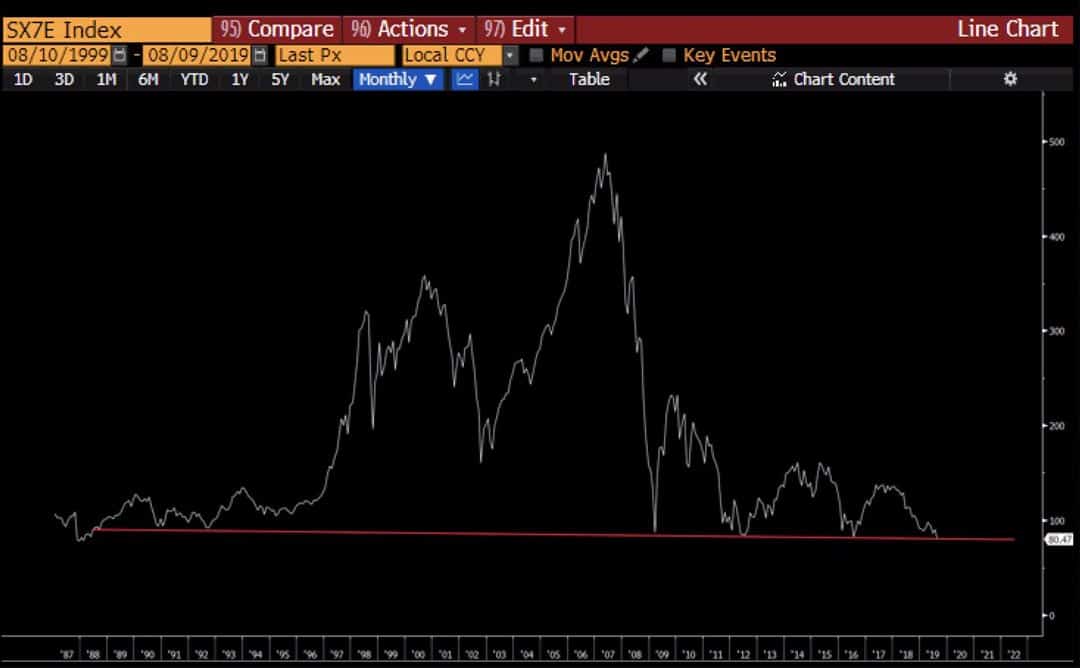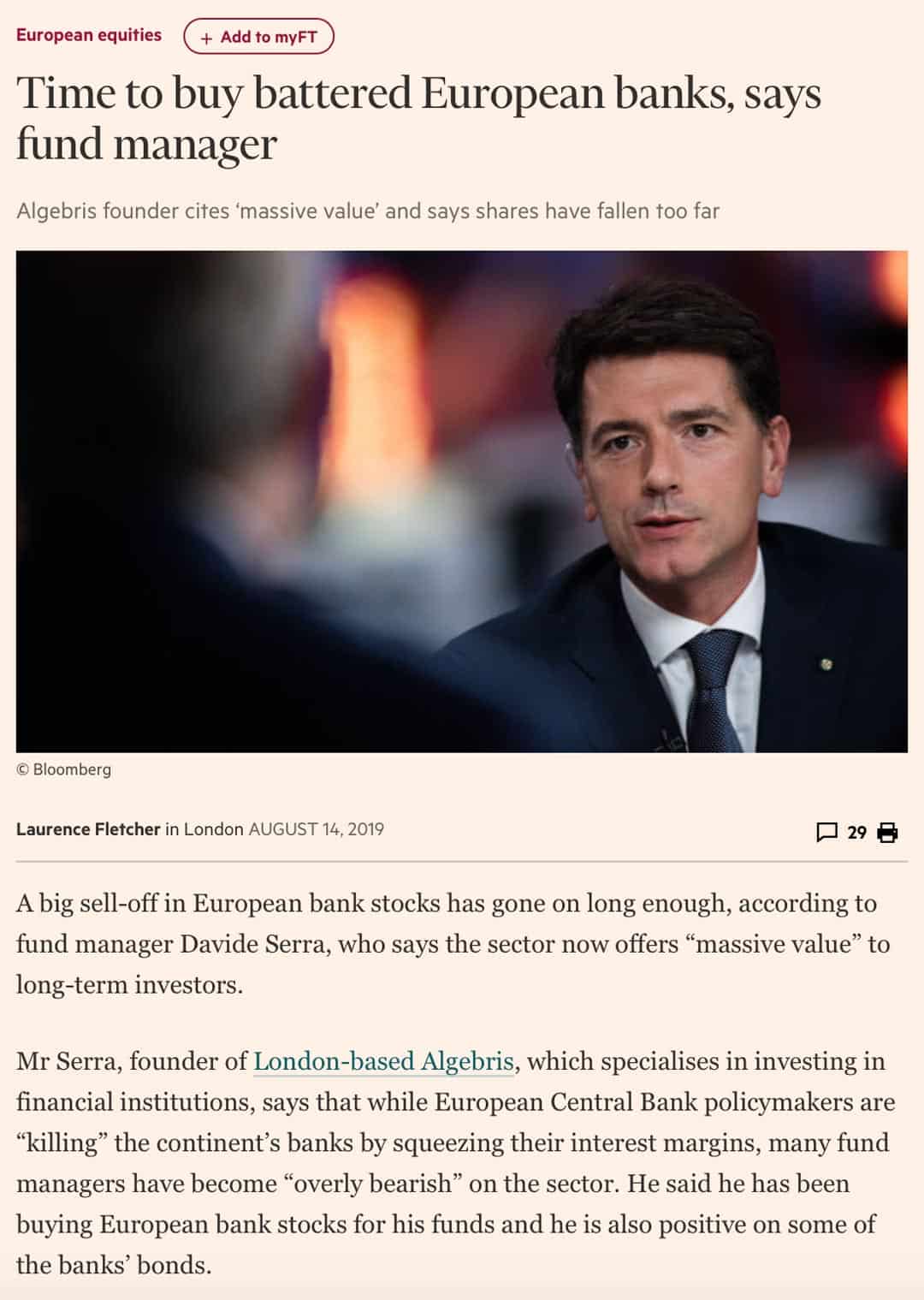"Quo vadis, European bank stocks?"
That's the question I have recently spent a fair amount of time thinking about, and asking some of the smartest people in my network about their view.
Are European bank shares so "down and out" that they are worth buying?
Or are they about to begin the next downward movement of their decade-long meltdown, and potentially drag down the rest of the market?
The chart below nicely illustrates the question.
The 30-year (!) Euro Stoxx Bank Index is close to a significant support level.
Even if you go back as far as the 1980s, it never went any lower than now.
However, if it did fall below this major support level, it would probably herald a (potentially brutal) resumption of its long-term downtrend. Or as macro hedge fund manager Raoul Pal recently tweeted:
"This level in the Euro Stoxx Bank Index is probably THE most important level of ANY chart pattern in the history of equity markets (hyperbole? I am not sure). A break of this would suggest a potential total collapse of the entire EU banking sector."
There is another side to the argument. Once a large number of market participants are asking such existential, pessimistic questions about a specific sector, you have usually reached the low-point of the crisis.

The Euro Stoxx Bank Index is now back where it was in 1987.
Does anyone even want to read about any of this anymore?
Currently, European bank stocks are undoubtedly among the world's most unfashionable and unfavoured investment themes. You are more likely to convince a climate change activist of the virtue of investing in Polish lignite mines than to get anyone interested in buying the stocks of major European banks.
The sector's numbers are as telling as they are staggering.
Over the past ten years, European bank shares have lost 50% of their value. During the same period, just about any other asset class has gained between 200% and 300%. Even US American banks have risen by 80%.
It's been an incredibly painful decade for these institutions' shareholders. Stocks of European banks have been crushed, re-crushed, and, for good measure, re-crushed again. They are now the equivalent of Chernobyl real estate. Everyone knows it's cheap, but no one will ever come over for a viewing.
The following are some of the prevalent headlines and longer-term themes that large European banks are currently widely associated with:
- In the age of zero or negative interest rates, banks can no longer make money off interest rate differentials. Operating a bank used to be about the old motto: "Borrow at 3, lend at 6, play golf at 3." However, the old banker's rule isn't valid anymore. The banks' entire business model and raison d'être have been pulled out from underneath them.
- Efforts to replace lost interest income by selling new and additional products to existing customers have been slow. This isn't surprising, given how the public dislikes and distrusts large banks – last but not least since half of all them have been found guilty of having security flaws.
- Banks' legacy software systems are often held together by brown tape, which makes it difficult to merge with other institutions. This factor and others hinder efforts to achieve cost savings and economies of scale.
- State-owned banks, particularly Germany's Landesbanken and Sparkassen, depress the sector's margins through pricing that is not based on market realities.
- The overall economic and political situation of Western Europe is such that management action can only influence the fate of a bank in a benign way. E.g., Italian banks have had to operate in an economy that has achieved zero growth since 1998. Even if you are the world's best bank CEO, succeeding in such an environment is challenging.
- When the 2008/09 financial crisis hit, US banks quickly acted to clean up their loan books. European banks, on the other hand, are to this day sitting on significant amounts of non-performing loans.
- If the current situation of negative interest rates persists, Europeans could withdraw cash en masse and cause a new bank panic.
- Blockchain-related innovations and cryptocurrencies, such as Facebook's Libra, could make the entire current banking system obsolete.
- Agile fintech companies are launching an avalanche of products to woo customers away from traditional banks.
And on it goes.
European bank stocks may be cheap, but these structural problems are likely to ensure that they will remain cheaper forever (or, go lower still).
Japan has already provided an example of how bank stocks can be a looser investment not just for years but decades. Just because a situation is terrible and valuations are low doesn't mean that there is a successful turnaround investment to be made. Japanese regionals looked super-cheap for decades but then got cheaper and cheaper and cheaper. These shares were a classic value trap.
Then again, once you start looking closely, there are also entirely good arguments for making the opposite case.
The night is darkest just before dawn
Optimists will claim that now is the right time to buy into European banks at rock-bottom prices.
After all, there is an equally long list of arguments you can make in favour of European bank stocks:
- The sentiment for the sector is so terrifyingly terrible that anyone afraid of the negative factors set out above will have already sold. Whenever an asset class is no longer seen as investible, it's always time to take a closer look. Everything that's widely known is already priced in, and European bank shares are now trading at capitulation valuations. Or, as the Financial Times recently reported in an article that discussed on fund manager's contrarian view of European banks: "The recent sell-off means the European banking sector is trading at just over half their stated book value, compared to a multiple of 1.2 times for the biggest US banks."
- Fintech is much less of a negative factor than widely thought because Europeans are incredibly reluctant to switch banking relationships. The older generation, in particular, will prefer using established banks. It's the older generation who still control >80% of Europe's financial wealth.
- Many of these banks can make massive progress by simply cutting staff, which is relatively easy if you are extremely overstaffed. Profitable Unicredit, for example, seems to be on the cusp of cutting a further 10% of its remaining staff.
- Silicon Valley-style companies like Facebook have had their fair share of data breaches, too. They will be just as distrusted by the broader public as large banks, which makes for a level playing field. Physical bank branches will soon be seen as an advantage again because many older clients (including myself) distrust pure plays.
- The banks who do earn money are trading at very low multiples compared to their earnings. As Warren Buffett says, "The price you pay determines your rate of return."
- Dividend yields for some European bank shares are now very attractive, and certainly more appealing than keeping cash in one of these banks' accounts.
The bottom line is that these large banks aren't going to go out of business tomorrow. Even their existing clientele will give many of them a few more decades of attractive income from their legacy business. That's especially true if they are managed with tight cost control and a view to maximising cash flow.
Members of the older generation will remember equally desperate situations from previous banking crises.

A worthwhile feature in the Financial Times discussing a contrarian's view – including insightful reader comments underneath the article (FT subscribers only).
When Citicorp made investors a fortune
Citigroup was a comparably uninvestable mess in the early 1990s (then trading as Citicorp). Its stock traded at USD15 a share and just about any catchphrase of today's banking crisis held true for America's largest bank at the time:
- Excessive loans to real estate projects had created an unprecedented level of questionable loans on the bank's portfolio.
- Operating expenses were escalating because of insufficient cost management during the previous good times.
- Management was seen as "in denial", as the Washington Post wrote years later in a seminal summary of the entire crisis.
- There was talk of systemic risk for the whole of the global banking system had Citicorp collapsed.
- Thousands of employees lost their jobs, which made for terrible press.
- Deposits were seen as at risk, and there was a constant fear of a run on the bank.
- A worried regulator ordered management to report to it monthly.
- Washington asked to be informed ahead of any significant management decisions.
- Various subsidiaries and investments were sold off to raise cash, which some say was done at fire-sale prices.
- To raise more equity, shares were issued on disadvantageous terms.
- Existing shareholders had seen the value of their investment shrink dramatically, and feared losing it all.
Does that all look and sound familiar?
I vividly remember reading about it in the Wall Street Journal and the New York Times on a nearly daily basis, since I lived in the US for some of the time when this crisis occurred.
Investors underestimated that a problem recognised can soon become a problem solved.
Ten years later, Citicorp's stock was trading at USD 583.
Anyone who had invested USD 10,000 at the time of maximum pessimism would have had nearly USD 400,000 a decade later. Though it would have taken nerves of steel because Citicorp shares were widely seen as one of the most toxic investments on offer at the time.
That's contrarian investing for you.
Not all crises are alike
My Citicorp example will inevitably lead to entirely fair criticism that this time, the circumstances are different altogether.
The structural headwinds that the European banks are facing, such as the rise of fintech players, will not go away. This time, banks' entire business models are under threat. What's more, European banks are set within the peculiar economic circumstances of the EU. It takes a brave man to project an increasing economic dynamism of the Eurozone.
Indeed, some fascinating figures are coming with the bear case for European bank stocks. These have relevance for anyone investing in Europe's economies.
Europe's banks don't just have to sort out their internal problems. They also have to operate in what has become a situation of seemingly never-ending institutional gridlock and political malaise.
Here is the data showing how badly the EU economies have performed compared to the rest of the world, based on figures provided by the World Bank:
- Between 2010 to 2017, the world's GDP increased from USD 65.96tr to USD 80.73tr, or 22.39%.
- During the same period, US GDP increased from USD 14.96tr to USD 19.39tr, a rise of 29.61%.
- The EU's GDP only increased from USD 16.98tr to USD 17.28tr, a mere 1.76%.
When the overall economy is growing, it's much easier for a bank to work its way out of problems. It can use newly generated profitable business to deal with the issues from the past. That's the kind of tailwind that helped US banks perform reasonably well during the stated period. Even just during the first three years after the 2008/09 crisis, the US banking sector managed to generate profits of nearly USD 300bn per year. Earning almost a trillion dollars in profits in three years helped US banks to recapitalise and get back on their feet.
European banks, on the other hand, did not benefit from such a period of sustained earnings.
As you can see, anyone looking for historical precedents will have to take extra care not to compare apples with pears. It's quite a complicated situation.
What I am convinced of so far
I researched all this because I wanted to write a report about a European bank worth investing in. Had I found the right stock, you would have received a notice about that report's availability rather than this Weekly Dispatch.
Following weeks of spending way too much time reading up on the subject and asking a broad selection of colleagues about the subject, I am at least a tiny bit wiser.
I'm now convinced of the following:
- There is probably (short-term) money to be made off special situations in the European banking sector. Due to the ongoing crisis, mergers and acquisitions of some kind or another will eventually take place. E.g., the right type of bet for this sector could be on going privates of smaller, publicly listed subsidiaries of large banks. Also, there may well be some smaller banks who can navigate the current situation or possibly even benefit from it.
- Europe remains an incredibly diverse continent, i.e., some countries are different than others when it comes to the prospects of investing in large banks. There will be some major banks in Europe that make for good investments in the long run. However, the availability of reliable, in-depth data about factors such as the quality of loan books remains a hurdle. Plus, large European banks are over-researched by equity analysts.
- Sentiment for the overall sector is so terrible that long-term investments based on low valuations might make sense. However, the key here is long-term. In the short term, sentiment can kill you more than you are getting value out of these investments. The lack of clarity about short-term downside may well mean that one should stay clear of the sector altogether.
Though I consider even these conclusions work in progress. My mind remains wide open for realisations about European banks that I have not yet had, and which smarter people could inspire me to.
The primary reason why I wrote this somewhat inconclusive Weekly Dispatch was to tap into the industry intel that I know exists among my readers.
So, I'm asking you: "What's your take?"
Do you have strong feelings about banks, especially with regards to the sector offering better investment opportunities than is widely perceived? (The bear case is of less interest to me because the world is awash in information about it.)
Am I missing out on any particular factors that could turn out to be game-changers for this sector?
Are there any niche opportunities I should look at?
If so, I'd love to hear from you. As anyone who has ever written to me will know, at least for now I am personally replying to every single email.
My quest to analyse and understand if there is any money to be made in this downtrodden sector will continue for the time being.
Did you find this article useful and enjoyable? If you want to read my next articles right when they come out, please sign up to my email list.
Share this post:
Get ahead of the crowd with my investment ideas!
Become a Member (just $49 a year!) and unlock:
- 10 extensive research reports per year
- Archive with all past research reports
- Updates on previous research reports
- 2 special publications per year








